

Aberration. An aberration is something that deviates from the normal way.
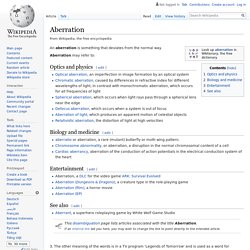
Aberration may refer to: Optics and physics[edit] Optical aberration, an imperfection in image formation by an optical systemChromatic aberration, caused by differences in refractive index for different wavelengths of light, in contrast with monochromatic aberration, which occurs for all frequencies of lightSpherical aberration, which occurs when light rays pass through a spherical lens near the edgeDefocus aberration, which occurs when a system is out of focusAberration of light, which produces an apparent motion of celestial objectsRelativistic aberration, the distortion of light at high velocities Biology and medicine[edit] Entertainment[edit] See also[edit] Aberrant, a superhero roleplaying game by White Wolf Game Studio 3.
Aberration. Definition of Aberration by Merriam-Webster. Shift of spectral lines. Analytics-magazine. March/April 2015 By Jay Liebowitz In the fall 2014 issue of Johns Hopkins Magazine, Aneesh Chopra (the first U.S. chief technology officer) said, “When it comes to making major decisions, there are two camps.
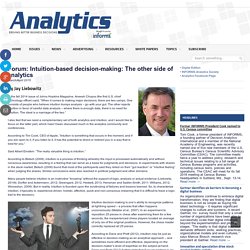
One consists of people who believe intuition trumps analysis – go with your gut. 131223083811. People who prefer to combine quick, intuitive decisions with analysis, make the best decisions in a crisis situation, a new study shows.
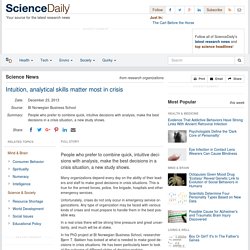
Many organizations depend every day on the ability of their leaders and staff to make good decisions in crisis situations. This is true for the armed forces, police, fire brigade, hospitals and other emergency services. Unfortunately, crises do not only occur in emergency service organizations. Artificial-intuition-will-supersede-artificial-intelligence-experts-say.amp. Artificial intelligence (AI) is so last year, according to some experts.
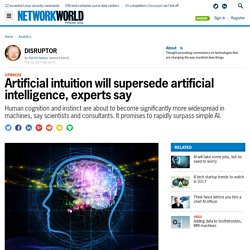
Scientists at MIT this week claimed a breakthrough in how human intuition can be added to algorithms. And in a separate, unrelated report, Deloitte Consulting is chastising the business community for not comprehending fully that new, cognitive computing technology should be exploited. “Artificial intelligence is only the beginning,” researchers write in a Deloitte University Press article about Deloitte's February study. + Also on Network World: Using artificial intelligence to teach computers to see + “Advanced cognitive analytics” is just one of the “fast-evolving” technologies businesses need to get a handle on, they say. Www.psychologytoday. Last Monday, I engaged in a public conversation with comedienne Ilana Glazer on the topic of “Intuition” at the Rubin Museum in New York City.
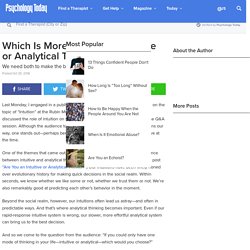
For 45 minutes, we discussed the role of intuition on stage and in everyday life. Afterward came the Q&A session. Although the audience tossed a number of thought-provoking questions our way, one stands out—perhaps because I’m not satisfied with the response I gave at the time. One of the themes that came out in the discussion was the need to find a balance between intuitive and analytical thinking.
(This is a position I argued in my blog post “Are You an Intuitive or Analytical Thinker? ") article continues after advertisement Beyond the social realm, however, our intuitions often lead us astray—and often in predictable ways. Are You an Intuitive or Analytical Thinker? Here’s a simple test of reasoning ability: “A bat and a ball cost $1.10 in total.
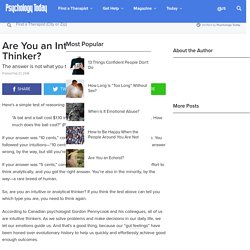
Analytical/Intuitive Thinking. This article discusses the different strengths and weaknesses of analytical and intuitive thinking, which combined may be called holistic thinking.

Because thinking is in its nature invisible and abstract, the article uses an analogy by way of representation: the anatomy of the cornea. At the very center of the cornea are clustered cone cells, which have the function of focusing on objects far or near. Surrounding the cone cells are the more numerous rod cells, which provide peripheral vision. If the cone cells deteriorate, when one attempts to focus upon an object, it disappears; a black spot in the center. But if you lose peripheral vision, even if you retain the ability to focus, it is like observing the world one speck at a time through the means of the focused beam of a flashlight.
This analogy can be convincing when seeking to persuade lawyers that analysis is not the whole universe of thinking. Analytical thinking is powerful. Www.academia. Critprac. 1788 THE CRITIQUE OF PRACTICAL REASON by Immanuel Kant translated by Thomas Kingsmill Abbott PREFACE PREFACE.
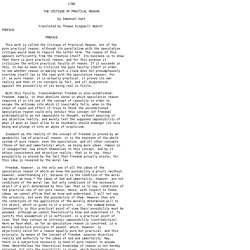
This work is called the Critique of Practical Reason, not of the pure practical reason, although its parallelism with the speculative critique would seem to require the latter term. The reason of this appears sufficiently from the treatise itself. Its business is to show that there is pure practical reason, and for this purpose it criticizes the entire practical faculty of reason. Speculations_vi_a_journal_of_speculative_reason_volume_6. A History of Philosophy: History of modern philosophy - Friedrich Ueberweg - Google Books. Speculative Philosophy - Donald Phillip Verene - Google Books. St1-q79-aa11-13. Warwick.ac. Summa Theologica, Volume 3 (Part II, Second Section) - St Thomas Aquinas - Google Books. Hegel's Speculative Good Friday: The Death of God in Philosophical Perspective - Deland Scott Anderson - Google Books.
Viewcontent. Medieval Theories of Practical Reason. 1.
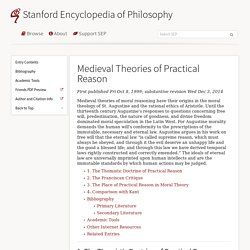
The Thomistic Doctrine of Practical Reason When one chooses through one's free will to live ‘honorably and rightly’ in accordance with divine law, one can reasonably be thought to live a moral life. Despite the human ability to reason according to divine principles, the human condition does not permit the attainment of moral perfection through natural means alone. Augustine asserts that only through grace, sent freely by God to assist the human will can one achieve true moral goodness.
Prudence, which is the ability to choose good and avoid evil, intellectual contemplation, moral and political virtue, friendship, education and character (all essential elements in Aristotle's ethics) are subsumed in Augustine's moral theology under the command to love God. Practical Reason. 1.
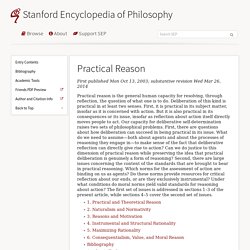
Practical and Theoretical Reason Practical reason defines a distinctive standpoint of reflection. When agents deliberate about action, they think about themselves and their situation in characteristic ways. Isaac Newton. Influential British physicist and mathematician Sir Isaac Newton PRS (25 December 1642 – 20 March 1726/27[a]) was an English mathematician, physicist, astronomer, theologian, and author (described in his own day as a "natural philosopher") who is widely recognised as one of the most influential scientists of all time and as a key figure in the scientific revolution.
Isaac Newton. Philosophiæ Naturalis Principia Mathematica. Kepler's Three Laws. Kepler orbit. An elliptic Kepler orbit with an eccentricity of 0.7, a parabolic Kepler orbit and a hyperbolic Kepler orbit with an eccentricity of 1.3. The distance to the focal point is a function of the polar angle relative to the horizontal line as given by the equation (13) Introduction[edit] From ancient times until the 16th and 17th centuries, the motions of the planets were believed to follow perfectly circular geocentric paths as taught by the ancient Greek philosophers Aristotle and Ptolemy.
Variations in the motions of the planets were explained by smaller circular paths overlaid on the larger path (see epicycle). As measurements of the planets became increasingly accurate, revisions to the theory were proposed. Johannes Kepler[edit] Kepler's laws of planetary motion. Scientific laws describing motion of planets around the Sun Figure 1: Illustration of Kepler's three laws with two planetary orbits. The orbits are ellipses, with focal points F1 and F2 for the first planet and F1 and F3 for the second planet.
The Sun is placed in focal point F1.The two shaded sectors A1 and A2 have the same surface area and the time for planet 1 to cover segment A1 is equal to the time to cover segment A2.The total orbit times for planet 1 and planet 2 have a ratio . In astronomy, Kepler's laws of planetary motion, published by Johannes Kepler between 1609 and 1619, describe the orbits of planets around the Sun. The laws modified the heliocentric theory of Nicolaus Copernicus, replacing its circular orbits and epicycles with elliptical trajectories, and explaining how planetary velocities vary. Thomas Aquinas. Thomas Aquinas (; Italian: Tommaso d'Aquino, lit. 'Thomas of Aquino'; 1225 – 7 March 1274) was an Italian[10][11] Dominican friar, philosopher, Catholic priest, and Doctor of the Church.
Practical reason. Law of noncontradiction. Practical reason. Techne. "Techne" is a term, etymologically derived from the Greek word τέχνη (Ancient Greek: [tékʰnɛː], Modern Greek: [ˈtexni] ( )), that is often translated as "craftsmanship", "craft", or "art". Bird's-eye view. It can be an aerial photograph, but also a drawing. Before manned flight was common, the term "bird's eye" was used to distinguish views drawn from direct observation at high locations (for example a mountain or tower), from those constructed from an imagined (bird's) perspectives.
Theory. Theories guide the enterprise of finding facts rather than of reaching goals, and are neutral concerning alternatives among values.[1]:131 A theory can be a body of knowledge, which may or may not be associated with particular explanatory models. Wars of Alexander the Great. Crotone. Coordinates: in Calabria, Italy Crotone (Italian: [kroˈtoːne] History[edit] Magna Graecia. Pythagoreanism. Pythagoreanism was the system of esoteric and metaphysical beliefs held by Pythagoras and his followers, the Pythagoreans, who were considerably influenced by mathematics, music and astronomy. Pythagoreanism originated in the 5th century BC and greatly influenced Platonism.
Pythagoras. Italiotes. Anaximander. Ionian School. Nature. Phenomenon. Theology. Cosmology. Chaos. Cosmos. Pre-Socratic philosophy. Hellenistic philosophy. Ancient Greek philosophy. Speculative reason. Auguste Comte. Positivism. Definition of obscurantist in English by Oxford Dictionaries. Definition of Obscurantism by Merriam-Webster. Obscurantist. Life. Abiotic component. Biophysical environment. Ecology. Habitat. Naturalistic observation. Naturalistic decision-making. Gary A. Klein. Recognition primed decision.
Categorization. Prototype theory. Archetype. Jungian archetypes. Psychological Types. Psychiatrist. Carl Jung. Id, ego and super-ego. Sigmund Freud. Late Middle Ages. Meaning of life. Truth. Instinct. Reason. Evidence. Proof. Intuition. Engineering. Measurement. Reproducibility. Scientific law. Philosophical theory. List of natural phenomena. Positivism. Friedrich Nietzsche. Alfred Espinas. Praxeology. Positivism. Auguste Comte. Henry Osborn Taylor. Memoirs of the Principal Events in the Life of Henry Taylor, of North Shields by Henry Taylor. Memoirs of the Principal Events in the Life of Henry Taylor of North Shields ... - Henry Taylor. The medieval mind; a history of the...